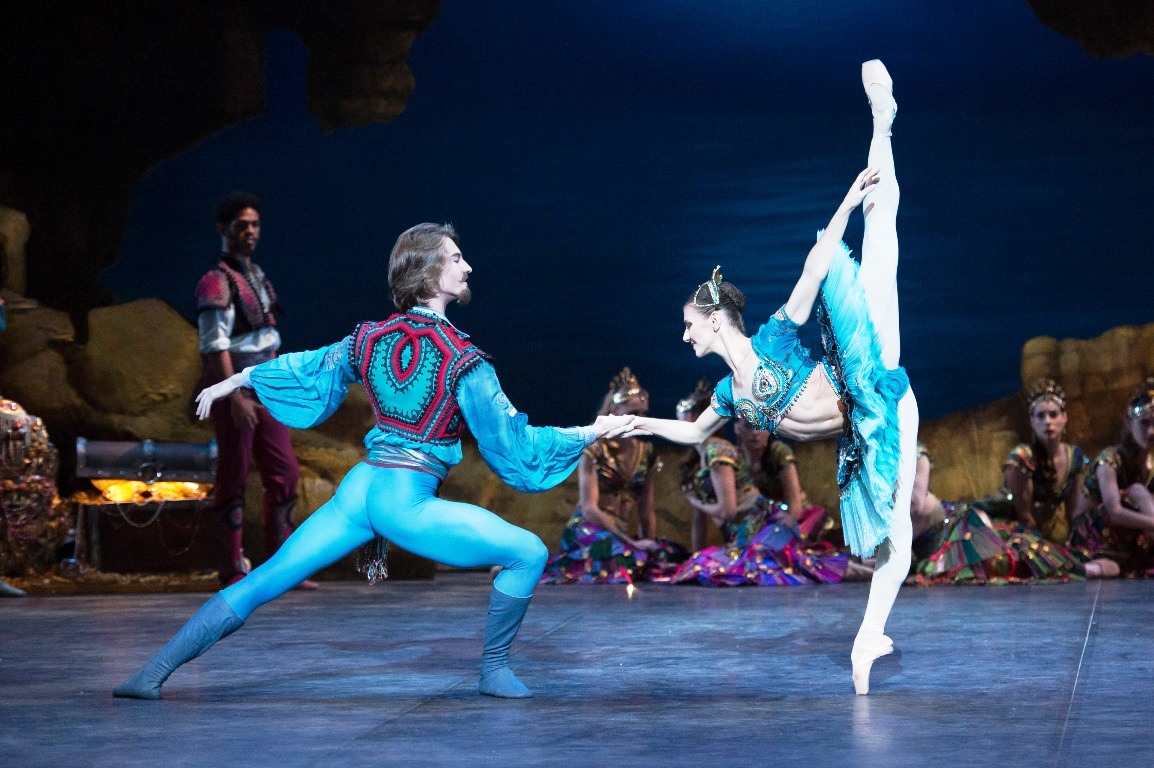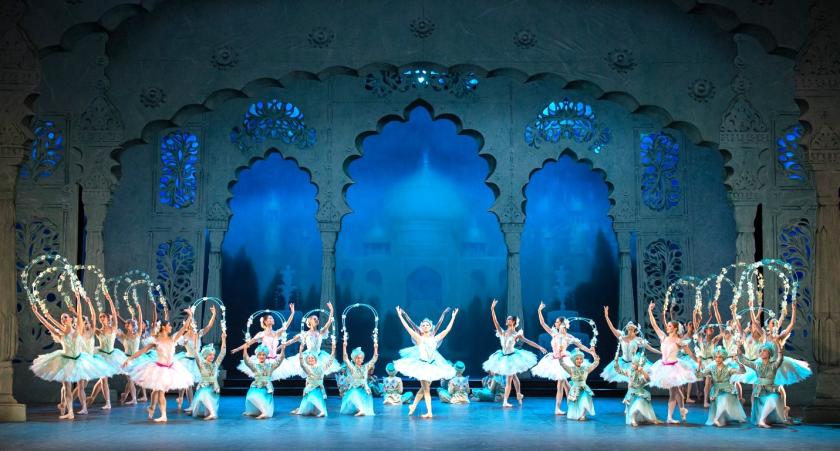How silly is ballet allowed to be? It is a question that is not, well, as silly as it looks. English National Ballet’s director, Tamara Rojo, has set out her stall with a glitzy production of this 19th-century classic, her first full-length commission for her new company. What she’s selling from that stall, however, is moot. Le Corsaire has a great pedigree: choreography by Marius Petipa, with a central pas de trois that is (reduced from trois to deux) endless gala fodder for its spectacular swoony razzmatazz.
But it also has the world’s most ludicrous plot – indeed, calling it a plot probably contravenes the Trades Descriptions Act – all pirates, kidnapping and lots and lots of moustaches. This production, staged by Anna-Marie Holmes, has the story stripped down to the bare minimum, racing through what, in some companies, takes three and a half hours, in less than two hours of dance: pirates-kidnapping-rescue-love-story-more-pirates-more-kidnapping-more-rescue-more-love all zips past in a trice.
 And in between is the only reason for the piece’s survival, the remnants of Petipa’s grand orientalist fantasy. The fantastical, and fantastic, designs, by Bob Ringwood, pay tribute, with pastiche whacks at 19th-century Salon painters, bits of the Taj Mahal done up in Bollywood Dayglo colours, some token nods to Persia, or is it Istanbul, and really anything else you can name (right, Junor Souza, Erina Takahashi, Alina Cojocaru and Vadim Mutagirov, photo: ASH). The eye, indeed, is grateful for the last act’s famous Jardin Animé scene, when in a drug-induced haze the wicked pasha (Michael Coleman, hamming splendidly) imagines his concubines turned into flowers, and for a while a severe classicism reigns.
And in between is the only reason for the piece’s survival, the remnants of Petipa’s grand orientalist fantasy. The fantastical, and fantastic, designs, by Bob Ringwood, pay tribute, with pastiche whacks at 19th-century Salon painters, bits of the Taj Mahal done up in Bollywood Dayglo colours, some token nods to Persia, or is it Istanbul, and really anything else you can name (right, Junor Souza, Erina Takahashi, Alina Cojocaru and Vadim Mutagirov, photo: ASH). The eye, indeed, is grateful for the last act’s famous Jardin Animé scene, when in a drug-induced haze the wicked pasha (Michael Coleman, hamming splendidly) imagines his concubines turned into flowers, and for a while a severe classicism reigns.
The most radiant blooms in the garden are Alina Cojocaru (below, with Vadim Mutagirov), making her company debut after leaving the Royal Ballet last year, as Medora, and Shiori Kase as Gulnare, her fellow escaped slave. Both have the Petipa requirements, a rigorous technique overlaid with delicate port de bras and deep musicality. (More musicality, indeed, than this notoriously mishmashed score – nine composers, including the not-very-famous-for-a-reason Baron Boris Fitinhof-Schnell and Prince Pyotr van Oldenburg – deserves.)
 The men are equally adept at buckling their swashes: Vadim Muntagirov, an audience favourite, was slow to start, overshadowed by his supposed subordinates in the pirating biz, Junor Souza as his slave, Ali, and Yonah Acosta as Birbanto, his henchperson, but by Act II he was entirely in the spirit, his beautiful jump well in evidence.
The men are equally adept at buckling their swashes: Vadim Muntagirov, an audience favourite, was slow to start, overshadowed by his supposed subordinates in the pirating biz, Junor Souza as his slave, Ali, and Yonah Acosta as Birbanto, his henchperson, but by Act II he was entirely in the spirit, his beautiful jump well in evidence.
But at the end of the day, it’s hard to overlook the fact that the plot revolves around slavery, and selling women for sex. I hate to be a killjoy, but all the kitsch romps in the world, all the rumpty-tump music, all the pretty sets and glorious dancing are all in service to this brute fact. I know it’s supposed to be a fantasy. I know it’s a mystical “then” when it wasn’t supposed to matter. But I had, and have, a lot of trouble moving past it.
- At the London Coliseum until 19 January, and then at the Palace Theatre, Manchester, 11-15 February














Add comment